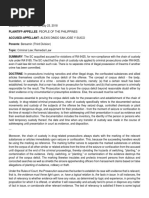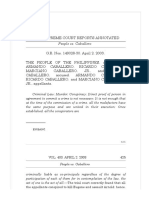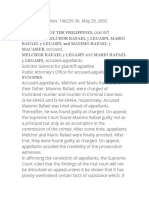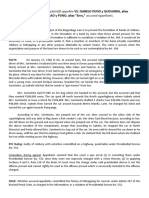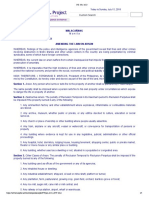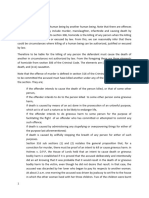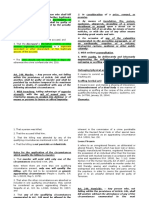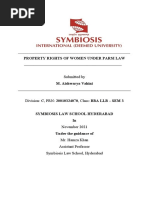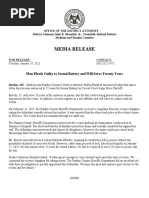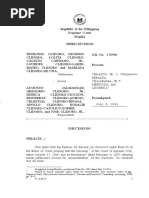Homicide
Homicide
Uploaded by
BrianCopyright:
Available Formats
Homicide
Homicide
Uploaded by
BrianOriginal Title
Copyright
Available Formats
Share this document
Did you find this document useful?
Is this content inappropriate?
Copyright:
Available Formats
Homicide
Homicide
Uploaded by
BrianCopyright:
Available Formats
Art. 249, Homicide.
- Any person who, not falling within the
provisions of Article 246, shall kill another, without the attendance of
any of the circumstances enumerated in the next preceding article,
shall be deemed guilty of homicide and be punished by reclusion
temporal.
Homicide, defined.
Homicide is the unlawful killing of any person, which is neither parricide,
murder, nor infanticide.
Elements:
(1) That a person was killed;
(2) That the accused killed him without any justifying circumstance;
(3) That the accused had the intention to kill, which is presumed;
(4) That the killing was not attended by any of the qualifying
circumstances of murder, or by that of parricide or infanticide.
“Shall kill another.”
In homicide, the victim must be killed to consummate the crime. If the
victim is not killed, it is either attempted or frustrated homicide.
Penalty when the victim of homicide is under 12 years of age.
The penalty for homicide shall be reclusion perpetua when the victim is
under 12 years of age. (Sec.10, R.A. No. 7610)
Intent to kill is conclusively presumed when death resulted.
When death resulted, even if there is no intent to kill, the crime is
homicide, not merely physical injuries, because with respect to crimes of
personal violence, the penal law looks particularly to the material results
following the unlawful act and holds the aggressor responsible for all the
consequences thereof. (U.S. v. Gloria, 3 Phil. 333)
Evidence of intent to kill is important only in attempted or frustrated
homicide.
In attempted or frustrated homicide, the offender must have the intent
to kill the victim. If there is no intent to kill on the part of offender, he is liable
for physical injuries. (Arts. 263-266) only.
Usually, the intent to kill is shown by the kind of weapon used by the
offender and the parts of the victim’s body at which the weapon was aimed,
as shown by the wounds inflicted. Hence, when a deadly weapon, like a bolo,
is used to stab the victim in the latter’s abdomen, the intent to kill can be
presumed.
Exception:
But if the accused went to his wife, who was living separately from him,
to entreat her to live with him again, but a cousin of his wife provoked him
then and there and caused him to assault him (wife’s cousin) and her son by
first marriage, with a bolo, inflicting physical injuries, caused indiscriminately
and not deliberately, the purpose of the accused in going to the house, and
not the kind of weapon he carried nor the parts of the bodies of the victims
on which the wounds were inflicted, is indicative and determinative of his
intention. The accused is liable only for physical injuries. (People v. Penesa,
81 Phil. 398)
Note: The bolo which the accused carried with him is one ordinarily used
by farm laborers and the accused was such a farm laborer.
Intent to kill must be proved beyond reasonable doubt.
The Court of Appeals concluded that the petitioner had no intention to
kill the offended party, in view of petitioner’s testimony:
“Q - In other words you want to tell us that you will do
everything you could to stop Nacionales digging the canal,
because you need water?
A - Yes, sir, because I need the water.”
Held: The intent to kill being an essential element of frustrated or
attempted homicide, said element must be proved by clear and convincing
evidence. Such element must be proved with the same degree of certainty as
should not be drawn in the absence of circumstances sufficient to prove such
intent beyond reasonable doubt. (Mondragon v. People, G.R. No. L-17666,
June 30, 1966)
That the death of the deceased was due to his refusal to be operated
on, not a defense.
The fact that the victim would have lived had he received appropriate
medical attention is immaterial. Hence, the refusal of the deceased to be
operated on does not relieve the offender of the criminal liability for his death.
(People v. Sto. Domingo, C.A., G.R. No. 3783, May 31, 1939; People v. Flores,
CA-G.R. No. 3567, May 25, 1939)
Note: This ruling is based on Article 4, par. 1, Book I, R.P.C.
The killing must not be justified.
If the accused killed the deceased in self-defense, defense of a relative,
defense of a stranger, or under any of the other justifying circumstances
(Art.11), the accused is not liable for homicide or any other crime.
“Without the attendance of any of the circumstances enumerated in
the next preceding article” or of the qualifying circumstances of
parricide or infanticide.
In the absence of clear proof of any circumstance that would qualify as
murder the killing of the deceased, the guilty person should be sentenced only
for homicide. (People v. Cuaresma, et al., 94 Phil. 304)
The offender should not be the father, mother or child, or legitimate
other ascendant or legitimate other descendant or spouse of the deceased, for
otherwise the crime would be parricide.
You might also like
- Legal Ethics Memorandum of AdviceDocument6 pagesLegal Ethics Memorandum of Advicejoanabud100% (1)
- Affidavit of Loss - Agustin (NC II Certificate)Document1 pageAffidavit of Loss - Agustin (NC II Certificate)Antonio J. David II71% (7)
- Constitution, Constitutional Law and Politics Bangladesh Perspective - Abdul HalimDocument545 pagesConstitution, Constitutional Law and Politics Bangladesh Perspective - Abdul HalimMd Ahsan-Ul- Kabir100% (1)
- People vs. San Jose DigestDocument7 pagesPeople vs. San Jose DigestEmir Mendoza100% (1)
- Lourdes A. Sable Vs People of The Philippines G.R No. 17796, April 7, 2009Document1 pageLourdes A. Sable Vs People of The Philippines G.R No. 17796, April 7, 2009Wena Mae CristobalNo ratings yet
- Legal Logic Book by Evangelista SummaryDocument8 pagesLegal Logic Book by Evangelista SummaryMoon100% (23)
- Labitag Reviewer PDFDocument165 pagesLabitag Reviewer PDFChristian Ivan Daryl DavidNo ratings yet
- Formats of Sworn Statements in Compliance With Sec 12 Art III of The 1998 ConstitutionDocument4 pagesFormats of Sworn Statements in Compliance With Sec 12 Art III of The 1998 ConstitutionAnna MirandaNo ratings yet
- Art 275 RPC, Reyes, Book TwoDocument1 pageArt 275 RPC, Reyes, Book TwoNeil bryan MoninioNo ratings yet
- People v. Caballero, 400 SCRA 424 (2003)Document30 pagesPeople v. Caballero, 400 SCRA 424 (2003)Esz ChuaNo ratings yet
- Technical English 1 Legal FormsDocument11 pagesTechnical English 1 Legal FormsRecson BangibangNo ratings yet
- Case Digest.Document5 pagesCase Digest.Clerk Janly R FacunlaNo ratings yet
- Alternative CircumstancesDocument3 pagesAlternative CircumstancesTin AngusNo ratings yet
- People vs. Nocido, G.R. No. 240229Document17 pagesPeople vs. Nocido, G.R. No. 240229Ran NgiNo ratings yet
- Criminal Law Persons Criminally Liable Degree of Participation AccessoriesDocument2 pagesCriminal Law Persons Criminally Liable Degree of Participation AccessoriesGil Paterno G. MendozaNo ratings yet
- The People of The Philippines, Rafael Y Legaspi, and Maximo Rafael Y Macasieb, Melchor Rafael Y Legaspi Y LegaspiDocument35 pagesThe People of The Philippines, Rafael Y Legaspi, and Maximo Rafael Y Macasieb, Melchor Rafael Y Legaspi Y LegaspiNigel AlinsugNo ratings yet
- PEOPLE OF THE PHILIPPINES, Plaintiff-Appellee VS. ISABELO PUNO y GUEVARRA, Alias "Beloy," and ENRIQUE AMURAO y PUNO, Alias "Enry," Accused-AppellantsDocument3 pagesPEOPLE OF THE PHILIPPINES, Plaintiff-Appellee VS. ISABELO PUNO y GUEVARRA, Alias "Beloy," and ENRIQUE AMURAO y PUNO, Alias "Enry," Accused-Appellantsmei atienzaNo ratings yet
- People VS Bautista 254 Scra 621 - Case DigestDocument2 pagesPeople VS Bautista 254 Scra 621 - Case DigestElla Kriziana Cruz100% (1)
- Police Blotter ReportDocument1 pagePolice Blotter ReportEuge Bondad CominguezNo ratings yet
- Eugenio Case DigestDocument5 pagesEugenio Case DigestJoshua Evangelista GamitenNo ratings yet
- SPL Islaw & PLDocument96 pagesSPL Islaw & PLKaisser John Pura AcuñaNo ratings yet
- People of The Philippines, Appellee, vs. Nestor G. Soriano AliasDocument6 pagesPeople of The Philippines, Appellee, vs. Nestor G. Soriano AliasAllenMarkLupera100% (1)
- G.R. No. 12607 September 27, 1917 THE UNITED STATES, Plaintiff-Appellee, vs. RUFINO PARRO, Defendant-AppellantDocument1 pageG.R. No. 12607 September 27, 1917 THE UNITED STATES, Plaintiff-Appellee, vs. RUFINO PARRO, Defendant-AppellantLotsee ElauriaNo ratings yet
- JBPDocument7 pagesJBPKARLVINNo ratings yet
- People Vs UbaldoDocument2 pagesPeople Vs Ubaldokhailcaleb100% (1)
- Juario - Cri 314 - Final ProjectDocument2 pagesJuario - Cri 314 - Final Projectfranzrowel.geragoNo ratings yet
- Case Digest 101Document2 pagesCase Digest 101Meynard Magsino100% (1)
- Criminal Law Book 2: Crimes Against Public Order - Part 2Document18 pagesCriminal Law Book 2: Crimes Against Public Order - Part 2Melchor MaasinNo ratings yet
- People of The Philippine vs. CastilloDocument1 pagePeople of The Philippine vs. CastilloEthan KurbyNo ratings yet
- Progress Report - Shooting IncidentDocument1 pageProgress Report - Shooting IncidentCrystalNo ratings yet
- Module Lea 104 1Document30 pagesModule Lea 104 1Mary May MatabangNo ratings yet
- People Vs Abay CaseDocument6 pagesPeople Vs Abay Casepatricia.aniyaNo ratings yet
- April 30 Crim DigestsDocument355 pagesApril 30 Crim Digestspinkblush717No ratings yet
- Cjlaw (Book Ii)Document63 pagesCjlaw (Book Ii)Rolly HeridaNo ratings yet
- Robbery With Force Upoon ThingsDocument5 pagesRobbery With Force Upoon ThingsMonica FerilNo ratings yet
- Crimlaw2 ReviewerDocument7 pagesCrimlaw2 ReviewerLara Michelle Sanday BinudinNo ratings yet
- EviDocument19 pagesEviNic NalpenNo ratings yet
- Gonzales vs. SerranoDocument12 pagesGonzales vs. SerranoAnonymous KaNu0py71No ratings yet
- 6 - People vs. VelosoDocument4 pages6 - People vs. Velosogerlie22No ratings yet
- Criminal REVIEWDocument62 pagesCriminal REVIEWcailylouise09No ratings yet
- Laws On ArsonDocument26 pagesLaws On ArsonKeithly Charm DaracanNo ratings yet
- Final Poly 5.the Polygraph Examiner Subject and Examination RoomDocument28 pagesFinal Poly 5.the Polygraph Examiner Subject and Examination Roomkimberlyn odoñoNo ratings yet
- Fingerprint PatternsDocument1 pageFingerprint PatternsJhai Jhai Dumsyy100% (1)
- Module 2. CLBDocument4 pagesModule 2. CLBFrances ChugyawiNo ratings yet
- People Vs Abanes Crim DigestDocument1 pagePeople Vs Abanes Crim DigestCJNo ratings yet
- Authentication and Proof of DocumentsDocument29 pagesAuthentication and Proof of DocumentsMa. Danice Angela Balde-BarcomaNo ratings yet
- Art. 171 - 184Document8 pagesArt. 171 - 184Leomar Despi LadongaNo ratings yet
- Activity 1: Ca 2 - Non-Institutional Corrections (Community-Based Corrections)Document2 pagesActivity 1: Ca 2 - Non-Institutional Corrections (Community-Based Corrections)Wena Mae CristobalNo ratings yet
- Topic 1 - Art 246-Art 249 PDFDocument16 pagesTopic 1 - Art 246-Art 249 PDFMaitaNo ratings yet
- Law Enforcement Code of EthicsDocument1 pageLaw Enforcement Code of EthicsRosemarie FranciscoNo ratings yet
- Cri323 3RD Exm RVWRDocument3 pagesCri323 3RD Exm RVWRJo-ann Pino TindoyNo ratings yet
- BOOK TWO - Crimes and Penalties TITLE ONE - Crimes Against National Security and The Law of The Nations CHAPTER ONE - Crimes Against National Security SECTION 1 - Treason and EspionageDocument2 pagesBOOK TWO - Crimes and Penalties TITLE ONE - Crimes Against National Security and The Law of The Nations CHAPTER ONE - Crimes Against National Security SECTION 1 - Treason and EspionageAP CruzNo ratings yet
- FINAL Investigation REPORTDocument2 pagesFINAL Investigation REPORTrabanalgian3No ratings yet
- DIGEST - (21) Abarquez VS People of The Philippines PDFDocument2 pagesDIGEST - (21) Abarquez VS People of The Philippines PDFDannielle Anne Caliosan100% (1)
- Article 11 RPCDocument53 pagesArticle 11 RPCRuffa mae PortugalNo ratings yet
- PD 1613Document2 pagesPD 1613jury jasonNo ratings yet
- FP Review Notes '10Document10 pagesFP Review Notes '10Jeron Bert D. AgustinNo ratings yet
- 1CDI 1 OkDocument6 pages1CDI 1 OkJanbert SuarezNo ratings yet
- People Vs Rivera - GR NO. L-16442 MARCH 21, 1921 SCRADocument2 pagesPeople Vs Rivera - GR NO. L-16442 MARCH 21, 1921 SCRAMALALA MALALANo ratings yet
- Article 351. Premature Marriage Title Xiii. Crimes Against HonorDocument18 pagesArticle 351. Premature Marriage Title Xiii. Crimes Against HonorSanchinoDeeNo ratings yet
- Facts: Issues: Ruling:: PEOPLE v. MARCELINO OLOVERIO, GR No. 211159, 2015-03-18Document1 pageFacts: Issues: Ruling:: PEOPLE v. MARCELINO OLOVERIO, GR No. 211159, 2015-03-18Secret SecretNo ratings yet
- PEOPLE v. EDGAR GUTIERREZ Y CORTEZDocument8 pagesPEOPLE v. EDGAR GUTIERREZ Y CORTEZJhoNo ratings yet
- Criminal Law 1 Case DigestDocument4 pagesCriminal Law 1 Case DigestZhairaNo ratings yet
- HomicideDocument12 pagesHomicideIbidun TobiNo ratings yet
- Crim 2Document18 pagesCrim 2paoloNo ratings yet
- Adrs - Test 1 - 2 AnswersDocument18 pagesAdrs - Test 1 - 2 AnswersKarthick NatarasanNo ratings yet
- Aranas V MercadoDocument3 pagesAranas V MercadoParis LisonNo ratings yet
- Radiowealth Finance v. Pineda (2018)Document3 pagesRadiowealth Finance v. Pineda (2018)mc.rockz14No ratings yet
- United States v. John Paul Bommarito, 524 F.2d 140, 2d Cir. (1975)Document7 pagesUnited States v. John Paul Bommarito, 524 F.2d 140, 2d Cir. (1975)Scribd Government DocsNo ratings yet
- Construction of Penal StatutesDocument8 pagesConstruction of Penal StatutesashwindhatrwalNo ratings yet
- Aff of Loss-Plate No.Document4 pagesAff of Loss-Plate No.Don NaNo ratings yet
- Normativa en Sistemas AisladosDocument13 pagesNormativa en Sistemas AisladosJulio César BarahonaNo ratings yet
- Property Rights of Women Under Parsi LawDocument11 pagesProperty Rights of Women Under Parsi LawAishwarya VahiniNo ratings yet
- 1 Case: Dar V. Woodland Agro-Developmen Inc. 2 Case: Ros V. DarDocument3 pages1 Case: Dar V. Woodland Agro-Developmen Inc. 2 Case: Ros V. DarMa Tiffany CabigonNo ratings yet
- Void Marriages Case DoctrinesDocument5 pagesVoid Marriages Case DoctrinesBoletPascuaNo ratings yet
- Elvira Yu Oh, Petitioner, vs. Court of Appeals and People of THE PHILIPPINES, RespondentsDocument12 pagesElvira Yu Oh, Petitioner, vs. Court of Appeals and People of THE PHILIPPINES, RespondentsEJ SantosNo ratings yet
- Residential Tenancy AgreementDocument3 pagesResidential Tenancy AgreementPiso BaryaNo ratings yet
- James Allen Enochs Sexual BatteryDocument2 pagesJames Allen Enochs Sexual Batterythe kingfishNo ratings yet
- Joint VentureDocument6 pagesJoint VentureRohit BawaNo ratings yet
- Excessive Fines and Cruel and Inhuman PunishmentsDocument21 pagesExcessive Fines and Cruel and Inhuman PunishmentsRachelle CasimiroNo ratings yet
- Burgundy-Realty-Corporation vs. MAADocument4 pagesBurgundy-Realty-Corporation vs. MAAJANE MARIE DOROMALNo ratings yet
- Summer Degree Program Lecture AgreementDocument26 pagesSummer Degree Program Lecture AgreementKassahun Azezew AyidagnNo ratings yet
- A Discussion On Judicial Supervision of Police Functioning by Divyansh Hanu RathiDocument24 pagesA Discussion On Judicial Supervision of Police Functioning by Divyansh Hanu RathiLatest Laws TeamNo ratings yet
- Mustafa Alaih. However It Has Not Fully Played Its Part in Supporting The Increase of Welfare, Because ItsDocument14 pagesMustafa Alaih. However It Has Not Fully Played Its Part in Supporting The Increase of Welfare, Because ItsFahman AlghifariNo ratings yet
- Suprema Lex' Meaning Welfare of The People Is Supreme Law'Document2 pagesSuprema Lex' Meaning Welfare of The People Is Supreme Law'Anchal JainNo ratings yet
- $ Upreme !:ourt Jl!Lanha: 3repttblic of Tbe J'IjilippinegDocument9 pages$ Upreme !:ourt Jl!Lanha: 3repttblic of Tbe J'IjilippinegMonocrete Construction Philippines, Inc.No ratings yet
- NWL Third Party AuthorisationDocument2 pagesNWL Third Party Authorisationbi43baNo ratings yet
- Partnership Deed 2Document3 pagesPartnership Deed 2Subhaschandra SalianNo ratings yet
- Republic of The Philippines Professional Regulation Commission ManilaDocument3 pagesRepublic of The Philippines Professional Regulation Commission ManilaGocela JonathanNo ratings yet
- WORKMANDocument11 pagesWORKMANArmaan AroraNo ratings yet



